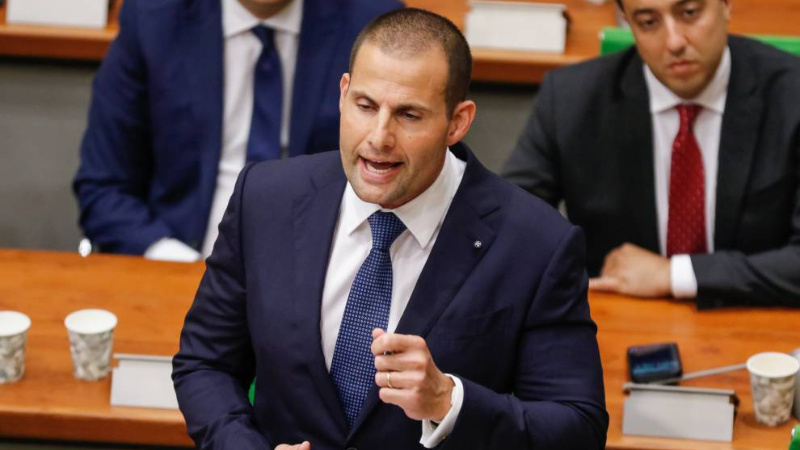Prime Minister Robert Abela pitched the idea to voters on Monday that their 8 June vote for the European Parliament elections would be in favour or against the magisterial inquiry into the corrupt deal on three of Malta’s public hospitals.
He made the statement as reports emerged that prosecutors had filed criminal charges against former prime minister Joseph Muscat and others. The names include Muscat’s aides, persons of trust, companies that facilitated the deal and civil servants who forgot they worked for the government and the nation, not the Party.
The elections on 8 June are not about that choice at all. That choice is not between justice and saving the Labour Party’s skin. The choice is about voting in our representatives to protect our interests (not the Labour Party’s) as rules that impact our rights and quality of life are decided.
This pitch by the prime minister shows he’s completely out of his depth and desperate as he faces the repercussions of decisions he made or to which he was an accomplice — like his decision to defend disgraced former prime minister Joseph Muscat against mounting evidence of his corruption so that he (Abela) could take the helm at Castille.
Evidence of corruption in the deal has been published by the press over the last nine years since assassinated journalist Daphne Caruana Galizia first started to shed light on corruption in the deal in 2015. The fact that the police did nothing about it does not mean Muscat or his aides are innocent.
It does not mean the enablers, those Robert Abela described as “loyal servants of the State” are not guilty of failing to serve nation before Party, blinded by their self-interest.
Ministers who knew about the corruption and turned a blind eye – they, too, must stand up to scrutiny.
Yet Abela raged on: “Voters will need to decide if the decisions made were draconian and against people who were loyal to the State”.
Democracy is about checks and balances. It is not about loyalty to the State. It is about protecting freedoms, rights, and the rule of law. If the government betrays the nation to sustain power or seek personal profit, the checks and balances should protect us.
The judiciary is a pillar with the duty to protect us. That is why the law prohibits attacks against the judiciary that may interfere with its functions. Let alone when a prime minister does it to protect a former prime minister facing a mountain of evidence against him.
How long have we heard the mantra that we must let the institutions work? According to the Labour Party, the institutions work as long as they do so in their favour after placing their “loyal servants of the State” in positions to protect their dirty deals.
It is ridiculous that we have to state the basics because it is precisely the one who is meant to protect our democracy that is undermining it.
The last magistrate who delivered an inconclusive inquiry on Egrant following terms of reference set by Joseph Muscat’s lawyer was appointed judge soon after. That’s the judiciary the Labour Party wants. Muscat has ridden on that for years in an attempt to clear his name.
There were no attacks against the magistrate, no open threats, and no questions about how the inquiry was carried out once the result suited their purpose. Instead, Magistrate Aaron Bugeja got promoted to Judge.
Yet, with the inquiry into the “fraudulent” hospitals deal that the National Audit Office said was not made in the public interest, Robert Abela and Joseph Muscat come out guns blazing.
“We’ll see how this inquiry was carried out… everyone will make their own minds up about the individuals involved, but also on the magisterial inquiry,” the prime minister said.
“And if it turns out someone’s rights were breached by how it was carried out, then, of course, history will judge that,” he added.
Rights have already been breached – those of citizens who paid €400 million to have better hospitals that have now deteriorated due to a lack of investment as millions went into the pockets of those complicit.
We know these facts because we exposed them in collaboration with national and international newsrooms. And while we do not know the inquiry’s conclusions, we know answers are needed.
So no, the vote on 8 June is not about a vote between this inquiry and sovereignty, as Robert Abela said. Pitching sovereignty in a European Parliament election doesn’t even make sense.
It is a desperate attempt to save a sinking ship. It is stunning that those at the centre of corruption allegations for years, betraying the trust people placed in them, thought this moment would never come.
They failed to account for the determination of individuals to protect their hard-earned freedoms and the determination not to let those in power get away with murder.














I really think he should be looking at the practical issues now as things are at last developing at a pace. He should be looking at the Party’s favourite builder to build the extension to Corradino that will almost certainly be required once they start squealing on each other as the trials progress. Given the poor quality of the work it will almost certainly be over “budget” and over time in development, BUT it should be ready by the time they are all convicted.
Good one Caroline I’m sure he will put it through the shredder.
Where is madam president?
Unbelievable!!!! 😡